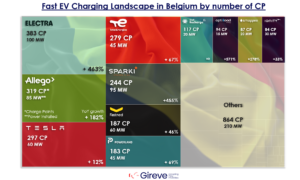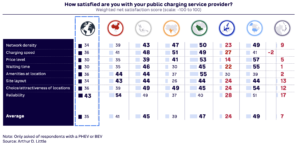From October 2020 onwards we started with our monthly ‘EV Frontrunners’ talks. Inspiring EV Leaders share their personal motivation, the challenges they encountered, highlights and view on the (daily) business.
For this first episode, we interviewed Frank Muehlon. He is in ‘charge’ of ABB’s Global EV Infrastructure Solutions.
At present, you are leading ABB’s Global e-Mobility Infrastructure Solutions Business for over 3 years now. Why did you decide to join and lead this business unit?
It is fascinating and inspiring to work in such a dynamic market like e-Mobility and to know that all your efforts will ultimately help to create a better and cleaner future for our planet. Globally we are seeing a real surge in the adoption of EV’s with predictions that by 2040, there will be 559 million EVs on the road and 55% of all new car sales and 33% of the global fleet will be electric. With this increase in EV adoption comes significant investment in charging infrastructure, both in the chargers themselves and the necessary grid connection.
This rapidly evolving sector is one of ABB Electrification’s highest growth areas and one which I am proud to lead. Within my role I have the pleasure of managing a global team which is developing innovations that directly impact the ability of countries around the world to meet their sustainability objectives. There is nothing more rewarding.
In addition, the role was a natural fit for me given my extensive experience leading global teams within the automotive industry and within electrification – e-mobility brings together both of these worlds and I am delighted to be able to leverage my knowledge to drive further growth for this segment.
The past six months have been challenging from a personal and business perspective. How was it like to manage a global business unit from your ‘home office’ and what are your learnings so far?
ABB Electrification is a fully global organization with teams across the world on all time zones. From an operational perspective this means that we were already set up for virtual communications and throughout the year we have continued to leverage those established practices to ensure the greatest team strength and performance for our customers. But really: whilst I’m not missing the permanent travelling, I do miss a lot the frequent direct interaction with our customers, partners and our team.
China and US EV markets are lagging behind in terms of sales figures compared to Europe due to COVID, downsizing subsidies and poor economics. Will the European continent become the new frontrunner (instead of China) to drive e-Mobility adoption?
China remains the largest e-mobility market globally, setting a benchmark for other countries to follow around the world. Meanwhile e-mobility in the US is developing rapidly with lots of new players entering the market. At ABB we have a strong presence across both territories, having strengthened our e-mobility portfolio with the acquisition of Chinese EV charging provider Chargedot and having being selected as a technology provider by some of the leading charging network operators in the US such as Electrify America.
We expect this European growth to continue and are delighted to partner with leading stakeholders such as IONITY which is developing Europe’s leading, high power charging network for electric vehicles with over 400 charging stations along major European highways.
The past 10 years ABB grew from ‘hardware’ manufacturer to a high-end solutions provider in the AC and DC infrastructure field, working along with all type of partners across the value chain. How do you stay focused and independent since large Automotive and Energy Companies are full force entering these markets with often proprietary solutions?
Our focus has always been on open standards and on developing a broad adoption base for our innovations. The sector is indeed becoming more crowded with lots of new market entrants focusing on niche solutions. Within ABB we have more than a decade of experience within the e-mobility segment and more than 100 years in Electrification, which means we have the ability to develop fully integrated end to end charging and power management solutions and to deliver at scale. As a global market leader we have now sold more than 17,000 DC fast chargers across more than 80 countries worldwide.
By 2030 we charge the equivalent of the cumulative electricity demand of Germany, The Netherlands and Belgium. What are the challenges to make this happen from an energy distribution and technology perspective?
If we were to reach a 100% electrified car fleet, we could expect an increase in total electricity demand of up to 10-20% depending on the country and the level of industrialization. Yet, in the short term over the next 5 years given the current rates of e-mobility adoption we should see little impact on the grid, even taking into consideration countries such as Norway where over 50% of new cars are EVs.
The important question is around when to charge. By creating intelligent charging hardware which can be digitally controlled, it is possible to optimize charging times and energy flow.
In addition, we should also consider the potential which bidirectional charging brings to the sector and how this can support balancing the grid. We have just announced the supply of our bi-directional charging technology to a Vehicle-To-Grid (V2G) partnership project with DREEV, a joint venture between Électricité de France (EDF) and Nuvve, which specializes in intelligent charging for EVs.
ABB’s solution integrated with DREEV software technology will enable EV drivers to export surplus power back to the grid. With potential to generate up to 20€/EV/month, V2G reduces the total cost of ownership and further boosts the adoption of EVs. Bi-directional chargers also help smooth the flow of uneven generation of electricity from renewable sources such as solar and wind. Another great use-case is for Vehicle-To-Home (V2H) to become more independent from the grid and leverage better the local and distributed energy.
Recently you released a DC wallbox (24 kW). What are your first thoughts and learnings on the acceptance for this solution?
We are already seeing good traction for the DC wallbox across all markets. The wallbox is an ideal solution for car charging at destinations where the car will be parked for 1 to 3 hours, whether at home, offices or parking facilities. It is also suitable for bus depots and can serve all cars and commercial vehicles on the market which means it has been well adopted by fleet operators.
It has an output range of up to 920V ensuring it can support all existing 500V battery EVs, plus the next generation of high-voltage electric vehicles being developed, thereby increasing revenue opportunities for operators and owners.
Looking back, what was the most memorable moment in your e-Mobility career so far?
The e-mobility sector is one fueled by so much passion and excitement it is hard to select just one highlight. The pace of development and resulting dynamism is high and our teams are dedicated to embracing challenge and developing continuous innovations which is inspiring.
A stand-out moment was when we as ABB announced our sponsorship of the ABB FIA Formula E championship, for which we will provide chargers from season 9. Opening a top-notch innovation center on Delft’s university campus and the following year a new enlarged state-of-the-art production facility and R&D labs in Tuscany are also very memorable moments. Another recent one is the inaugural World EV Day which we celebrated on 9 September. This was a fantastic global event and saw consumers around the world engaged in celebrating e-mobility solutions and the benefits which they can bring to society. It was a real proud moment to launch this to the world.
However, the next big moment will be when I will get my new EV delivered. With lots of progress which such a new model brings I will experience the superior driving and charging daily, always looking out for ABB chargers or using my ABB Terra AC wallbox in my garage.



